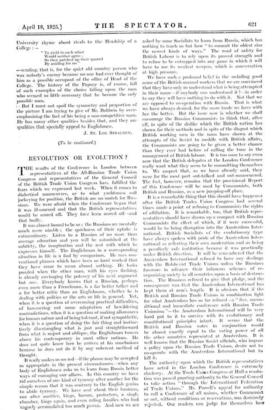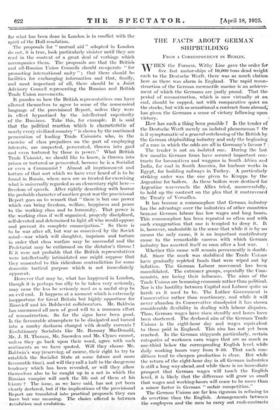REVOLUTION OR EVOLUTION?
THE results of the Conference in London between representatives of the All-Russian Trade Union Congress and representatives of the General Council of the British Trade Union Congress have fulfilled the fears which we expressed last week. When it comes to dialectical manoeuvres, or to what yachtsmen call jockeying for position, the British are no match for Russians. • We were afraid when the Conference began that it was ill-omened and that the British representatives would be scored off. They have been scored off—and that badly.
It was almost bound to be so ; the Russians are mentally much more nimble ; the quickness of their uptake is extraordinary. Listen to a Russian of no more than average education and you will be astonished at the subtlety, the imagination and the zest with which he expresses himself. The Englishman in a corresponding situation in life is a fool by comparison. He uses conventional phrases which have been so hard worked that they have come to mean almost nothing. Ile looks puzzled when the other man, with his eyes flashing, is already envisaging the potency of his next argument but one. Everybody knows that a Russian, perhaps even more than a Frenchman, is a far better talker and a far better critic than an Englishman, whether he is dealing with politics or the arts or life in general. Yet, when it is a question of overcoming practical difficulties, of hammering out some adaptation of bewildering contradictions, when it is a question of making allowances for human nature and of being tolerant, if not sympathetic, when it is a question of doing the fair thing and instinctively disentangling what is just and straightforward from what is unjust and oblique, the Englishman towers above his contemporary in most other nations. He does not quite know how he arrives at his conclusions because he does not do it by any coherent method of thought.
It really makes us sec red—if the phrase may be accepted as appropriate in the present circumstances—when any body of Englishmen asks us to learn from Russia better ways of managing our affairs. In this country we have rid ourselves of one kind of tyranny after another for the simple reason that it was contrary to the English genius to abide tyranny. We have sent about their business, one after another, kings, barons, protectors, a single chamber, kings again, and even ruling families who had vaguely accumulated too much power. And now we are asked by some Socialists to learn from Russia, which has nothing to teach us but how "to commit the oldest sins the newest kinds of ways." The road of safety for British Labour is to rely upon its proved strength and to refuse to be entrapped into any game in which it will have to use its weakest weapon, which is conversation at high pressure.
We have such a profound belief in the unfailing good .sense of the British manual workers that we arc convinced that they have only to understand what is being attempted in their name—if anybody can understand it !—in order to say they will have nothing to do with it. Not that we arc opposed to co-operation with Russia. That is what we have always desired, for the more trade we have with her the better. But the issue now is whether we shall encourage the Russian Communists to think that, after all, in spite of the dislike which the British nation has shown for their methods and in spite of the disgust which British working men in the mass have shown at the attempts of the Soviet to meddle with British affairs, the Communists are going to be given a better chance than they ever had before of calling the tune in the management of British labour. It is too soon to say even now that the British delegates at the London Conference really want what they seem to be committing themselves to. We suspect that, as we have already said, they were for the most part out-talked and out-manoeuvred. The fact, however, remains that the provisional Report of this Conference will be used by Communists, both British and Russian, as a new jumping-off place.
It is a remarkable thing that this should have happened after the British Trades Union Congress had several times made a point of refusing to Communists the rights of affiliation. It is remarkable, too, that British representatives should have drawn up a compact with Russian Communists the effect of which, if it were successful, would be to bring disruption into the Amsterdam International. British Socialists of the evolutionary type have always spoken with pride of the Amsterdam International as reflecting their own moderation and as being a peculiarly safe institution because it was practically under British direction. It will be remembered that the Amsterdam International refused to have any dealings with the Bolshevist Trade Unions unless the Russians forswore in advance their infamous schemes of reorganizing society in all countries upon a basis of destruction. The Russians refused to give that pledge, and the consequence was that the Amsterdam International has kept them at arm's length. It is obvious that if the British and Russian Trade Unions in combination fight for what Amsterdam has so far refused—a" free, unconditional and immediate conference with Russian Trade Unionism "—the Amsterdam International will be very hard put to it to survive with its evolutionary and constitutional principles intact. It seems that the British and Russian votes in conjunction would be almost exactly equal to the voting power of all the other countries represented at Amsterdam. It is well known that the Russian Soviet officials, who impose apolicy upon the Russian Trade Unions, desire not to co-operate with the Amsterdam International • but to kill it.
The authority upon which the British representatives have acted in the London Conference is extremely shadowy. At the Trade Unioa Congress at Hull a resolu tion was passed granting authority to the General Council to take action "through the International Federation of Trade Unions." Mr. Purcell's appeal for authority to call a Conference of all unions, whether Communist or not, without conditions or reservations, was decisively rejected. Our readers can judge for themselves how far what has been done in London is in conflict with the spirit of the Hull resolution.
The proposals for "mutual aid" adopted in London do not, it is true, look particularly sinister until they are read in the context of a great deal of verbiage which accompanies them. The proposals are that the British and all-Russian Union Councils should co-operate "for promoting international unity " ; that there should be facilities for exchanging information and that, finally, and most important of all, there should be a Joint Advisory Council representing the Russian and British Trade Union movements.
It puzzles us how the British representatives can have allowed themselves to agree to some of the nonsensical language of the provisional Report, unless they were in effect hypnotized by the intellectual superiority of the Russians. Take this, for example. It is said that the political reaction which is characteristic of nearly every civilized country " is shown by the continued persecution of leading Trade Unionists who, in the exercise of class prejudices on the part of employing interests, are suspected, persecuted, thrown into gaol and even tortured by those in power." What British Trade Unionist, we should like to know, is thrown into prison or tortured or persecuted, because he is a Socialist or even a Communist ? Almost all imprisonment and torture of that sort which we have ever heard of is to be found in Russia, where men are so treated for exercising what is universally regarded as an elementary right here— freedom of speech. After rightly describing with horror the probable character of another great war the provisional Report goes on to remark that "there is but one power which can bring freedom, welfare, happiness and peace to the working class and to humanity. That power is the working class if well organized, properly disciplined, self-devoted and determined to fight all who would oppose and prevent its complete emancipation." So there is to be war after all, but war as conceived by the Soviet mind—war which will slaughter, imprison and torture in order that class warfare may be successful and the Proletariat may be enthroned on the dictator's throne ! If it were not probable that the British representatives were intellectually intimidated one might suppose that they consented to this ridiculous contradiction for some domestic tactical purpose which is not immediately apparent.
However that may be, what has happened in London, though it is perhaps too silly to be taken very seriously, may none the less be seriously used as a useful step to an evil end. It happens at a moment which is extremely inopportune for Great Britain but highly opportune for Zinovieff and his Bolshevist collaborators. Mr. Baldwin has summoned all men of good will to a common effort of reconstruction. So far the signs have been good. Is the favourable atmosphere to be dissipated and turned into a murky darkness charged with deadly currents ? Evolutionary Socialists like Mr. Ramsay MacDonald, Mr. J. II. Thomas, Mr. Snowden and Mr. Clynes cannot, unless they go back upon their word, agree with such sentiments as we have quoted. Will they choose Mr. Baldwin's way (reserving, of course, their right to try to establish the Socialist State at some future and more favourable time), and will they call a halt to the dangerous tendency which has been revealed, or will they allow themselves also to be caught up in a net in which the Russian vampire will suck the life out of them at his leisure ? The issue, as we have said, has not yet been clearly declared, but if the implications of the provisional Report are translated into practical proposals they can have but -one meaning. The choiceoffered is between revauticor and evolution.











































 Previous page
Previous page